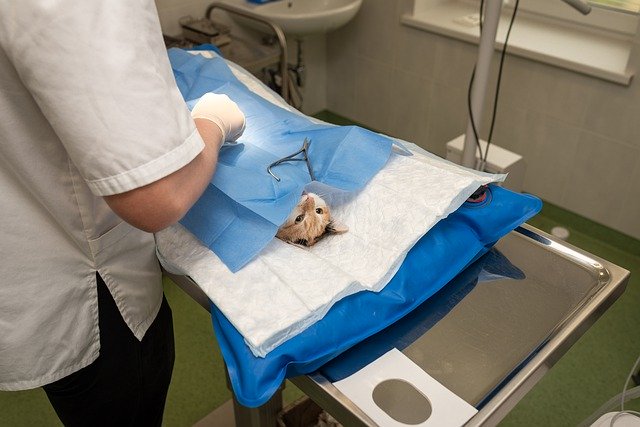Just like humans need specialists for different injuries, animals also require the services of various medical professionals.
You can become an expert in the anatomy, behavior, pathology, or nutrition of pets through training for one of 12 vet technician careers.
In this article, we will cover the top jobs with the highest earning potential.
You can become a qualified tech in one of these disciplines through a two-year associate’s degree.
You can find academies that oversee and award certifications for specialties in vet tech work through the National Association of Veterinary Technicians of America (NAVTA).
NAVTA is recognized by the American Veterinary Medical Association and maintains its specialties portal.
They point out that there’s a growing interest among vet technicians to obtain a higher level of recognition for advanced skills and knowledge in particular disciplines.
Besides, these specializations can increase your income.
Every academy monitored by NAVTA develops its curriculum, practicums, skill set requirements, examinations, and knowledge list.
All candidates who are up for a technical certification in a specialized field should complete these courses and pass an exam.
This must be done in addition to the standard two years at a community college.
After completing all studies and examinations, you can become certified as a veterinary technician specialist (VTS).
Article Table of Contents
The Importance of Vet Tech Specialization
NAVTA defines a vet technician as follows:
Vet technicians and technologists are trained to be veterinarians nurses, radiography technicians, surgical nurses, laboratory technicians, anesthetists, and client educators.
Veterinary technicians are graduates from a two-year program from a community college, university, or college accredited by the American Veterinary Medical Association (AVMA).
Veterinary technicians and technologists are required to pass a credentialing exam almost in every state.
These are not all the possibilities for the vet tech who wants to advance their knowledge and career.
Once they picked the specialization that fits them and they have completed the prerequisite courses, they become prime candidates for a new and exciting occupation in veterinary medicine.
To assist at a vet’s side and save the lives of animals every day, you should always be moving compassionately on a path of self-direction.
Being a specialized technician in, for example, equine medicine or as an animal nutritionist, is not only becoming an expert and increasing your earning potential but also getting in the field that will always require expert technicians.
Thus, you can be engaged in a tech-focused field that is expected to keep growing and developing and have a wide range of opportunities to strengthen your veterinary expertise.
Below, we covered the top-paying vet technician specialist careers.
To help you decide which specialization is for you, we include the comparison of average wages in each specialty.
The salary information is provided according to the 2019 data of US BLS, the Department of Labor, Indeed, PayScale, Zip Recruited, and SimplyHired.
Note that the salary can also vary, depending on such factors as certification, experience, as well as a region since states with higher living costs pay more.
The numbers listed below represent the median wage and are not based on work experience and region.
#3 Anesthesia & Analgesia Technician
The highest paying career is reported to be in the veterinary anesthesia and analgesia field.
These technicians ensure that veterinary surgeons can perform their duties.
To start this career, vet technicians can master the skills through the AVTAA.
While the duties of these technicians can overlap with other specialties, their expertise in the science of sedation puts them on the top.
Veterinary technician anesthetists provide assistance to vets in surgical procedures performed on different animals.
Their tasks usually include administering proper anesthesia, pre-anesthetic preparation, maintaining sedation of the animal through close monitoring, administering the proper dosage of sedative, managing the animal’s emergence from the sedative state.
They can also provide post-anesthetic care of the animal and maintain specialized equipment.
According to PayScale data, vet technicians with anesthesia skills make $33,969 on average.
Anesthetists’ vet technicians typically hold a four-year degree from an accredited vet institution, which increases their earning potential a lot.
#2 Surgical Technician
You need a comprehensive study course and a certification through the Academy of Veterinary Surgical Technicians to become a vet surgical technician.
This specialization focuses on assisting the vet during diagnosis and surgical procedures.
Surgical techs are trained to assist vets with a variety of surgical procedures, including diagnostic tests, proper sterility practices, surgery, as well as levels of wound care.
It includes changing and checking wound dressing, counseling of owners with wounded animals, and maintenance of healing wounds.
Besides, these techs may also handle administrative and clerical duties.
Such things as medication dosing, post-op consultation, administering IVs, catheters, the filling of animal prescriptions, or drawing blood can be quite common.
According to the data listed on Zip Recruiter, the average salary of vet surgical technicians is $48,207.
#1 Emergency & Critical Care Technician
Just like with human medicine, emergency personnel should be highly qualified and versatile, with extended knowledge and expertise.
If you can work in a fast-paced environment of an emergency clinic or respond to late-night calls, this specialization can be a great fit for you.
The daily duties of an emergency vet technician require a lot of the same skills as for the surgical tech.
They should maintain their composure when facing challenging situations, applying their training and expertise to help stabilize animals in need of critical attention.
Emergency techs working in intensive care or 24-hour animal hospitals monitor vital signs, take x-rays, clean wounds, take blood or stool samples, insert catheters, provide wound care, and maintain patients’ files.
According to PayScale, the average salary of emergency and critical care veterinary nurses (VNECC) is $68,000.
Other VTS Fields to Consider
Even though no clear salary data was available for the fields listed below, you can also consider other positions, including:
Equine Nursing Technician
If you love rural areas, horses, and variety, then becoming an equine nursing technician can be a good career choice for you.
The equine nursing technician is also known as a large animal vet tech.
You can gain an essential working knowledge of the husbandry industry through the Academy of Equine Veterinary Nursing Technicians.
Large animal vet techs assist vets with anything they might need.
They are generally responsible for bandaging wounds, administering medication, running blood and fluid tests, prepping for procedures or surgeries, giving injections, or taking x-rays.
Other tasks, which are more specialized, may include jogging horses into a pen to test the improvement of their injury or lameness, maintaining physical therapy records for outside consultation or follow-ups.
You may also be responsible for scheduling appointments.
These techs deal with numerous husbandry animals, such as cows, hogs, sheep, etc.
Equine nursing technicians should be flexible in their availability.
It means that you may have to work on weekends or holidays, as well as nights.
In some seasons, overtime can also occur.
You should also be highly cautious since horses are powerful animals.
Extended knowledge of equine locomotion and anatomy can greatly improve your ability to account for bites and kicks.
Zoological Medical Technician
If you like exotic animals and the learning environments of zoos, wildlife preserves, and aquariums, becoming a zoological medical technician can be the right choice.
Similar to equine vet techs, zoological vet techs are the right hand to the vet.
While dealing with many exotic animals, they should be knowledgeable in behavioral studies and animal science, as well as natural climate, diet, and sensitivities.
Their responsibilities include taking radiographs, filling prescriptions, wound care, operating diagnostic machinery or software, administering medications, administering fluids, cleaning of surgical equipment, assisting with general physical exams, inserting catheters.
These techs should also be able to give intramuscular or intravenous injections of medication or fluids.
An Essential and Promising Field
As long as people show tenderness, compassion, and care for the injured animals in the world, we will need well-trained, skilled, and expert people with the right specialization and credentials to make a difference.
Vet techs use their knowledge, passion, and commitment to the ethics code and contribute to an ever-growing field.
The careers covered in this article are just a few options among dozens.
Those who are interested and willing to get on a path to professionalism and self-study can pursue these disciplines.
Depending on your skills, education, and region, the salaries mentioned here represent the variety of options available in this in-demand area of modern medicine.
These industries are expected to grow and develop.




